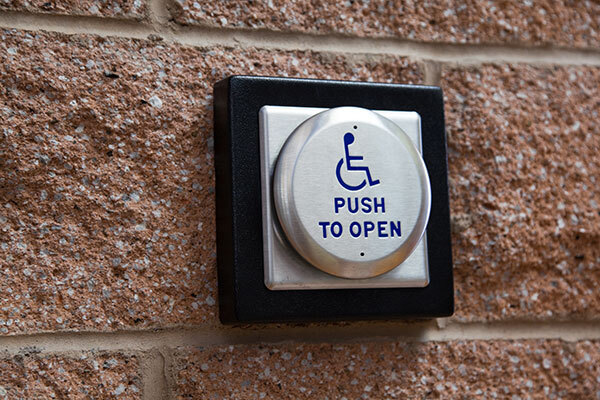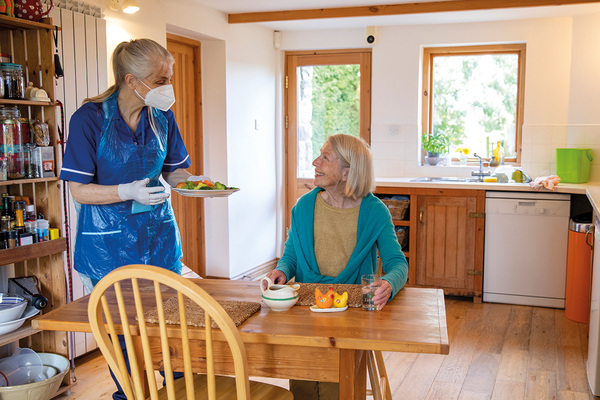You are viewing 1 of your 1 free articles

Without changes to government housing policy in 2022, there will be severe consequences for disabled people
People’s expectations of what constitutes an accessible home have changed, but official standards are stuck in the past. It’s time for a change, writes Nick Apetroaie
When I joined Habinteg Housing Association, which is known for its fantastic campaigning work to increase accessible housing across the country, I knew it was the next step in my journey supporting disabled people.
Having a background in both the housing and disability sectors, I was very keen to use my first six months at Habinteg to get under the skin of this unique organisation.
I’ve been travelling the length of the country visiting as many of our schemes as I can. I wanted to meet colleagues and tenants to hear first-hand what they think about our homes and services and what they need from us as their landlord. A couple of things really stuck out for me.
First, we have a lot of stock built to high accessibility standards, but in some cases those standards were high 20 or 30 years ago. Our customers’ expectations of what constitutes an accessible home has changed in that time and they now, quite rightly, expect more.
I think the challenge now, for us and the wider sector, is to engage with all the possibilities in technology, energy efficiency, new building materials and techniques to evolve our notion of the accessible homes of the future.
There is a great opportunity here to listen to what our customers want us to do differently, both in terms of how we build new homes and how we upgrade our current stock. It would be a real ‘co-production’ effort in its broadest sense.
I’m also really keen to explore how we can bring to life the notion of a pan-disability access standard for new homes.
The other thing I’m passionate about is doing something more for our customers in parts of the country that are really struggling. I’ve been taken aback by the complex social issues that we, along with many other housing associations, face in trying to provide a better housing solution to these regions.
These issues can be anything from lack of employment and training to substance misuse and, in some cases, a cycle of lack of aspiration born from historical lack of opportunity.
“I’m really keen to explore how we can bring to life the notion of a pan-disability access standard for new homes”
We can invest a lot of money in improving our stock – and that’s rightly so. However, if we don’t also try to tackle some of these societal issues, we may as well be a private landlord.
Habinteg is not alone in battling these issues on our schemes and I’m mindful that we can achieve the best impact when we work in partnership with other sector leaders and stakeholders.
We work in social housing because we care about people and communities and we are passionate about making a difference to people’s lives; therefore we need to look at these issues holistically.
That’s why Habinteg is working with and talking to other housing associations, as well as tenants, local authorities, charities and local community groups to find ways forward.
In between my visits to tenants, I also spent a significant amount of time thinking about how we can create more homes for disabled people. Ultimately, without improved policies from national and local government, this will be a tough challenge.
Recently appointed housing secretary Michael Gove has rebranded what was previously known as the Ministry of Housing, Communities and Local Government to the Department for Levelling Up, Housing and Communities.
His role will see him working through planning reforms and the post-Grenfell Building Safety Bill. Both of these are important priorities, but given that this summer the government published a National Disability Strategy, it’s critical that accessible housing policy moves up his agenda.
Last year, Habinteg revealed that there were more than 400,000 wheelchair users living in homes that are neither adapted nor accessible, yet there is no clear national strategy to improve the number of suitable homes being built.
Not only that, but our 2020 Forecast for Accessible Homes highlighted the fact that only 1.5% of all homes outside London are planned to be wheelchair-accessible over the next decade.
“Current demographic trends make it a certainty that in 20 years’ time the need for accessible homes will be far greater than it is now”
Many disabled people are on waiting lists with hundreds of people ahead of them. A lot of young wheelchair-users are also having to put their lives on hold, even turning down job offers because there is nowhere accessible to rent in the area they need to live in.
It’s disheartening that we’re still awaiting feedback from the government on its public consultation into raising the accessibility standards of new homes in England.
The consultation offers a critical opportunity to pave the way for a new era of high-quality homes built to the ‘accessible and adaptable’ standard. Habinteg wants this standard to be the mandatory baseline for all new homes, making them fit for the future of our society.
Current demographic trends make it a certainty that in 20 years’ time the need for accessible homes will be far greater than it is now. We sincerely hope that Mr Gove will act promptly to help level up the provision of accessible housing to meet this rising demand.
If government fails to do the right thing now, the consequences will be an increasing number of older and disabled people struggling to live safe and fulfilling lives in inadequate housing.
Nick Apetroaie, chief executive, Habinteg
Sign up for our care and support bulletin
Already have an account? Click here to manage your newsletters












